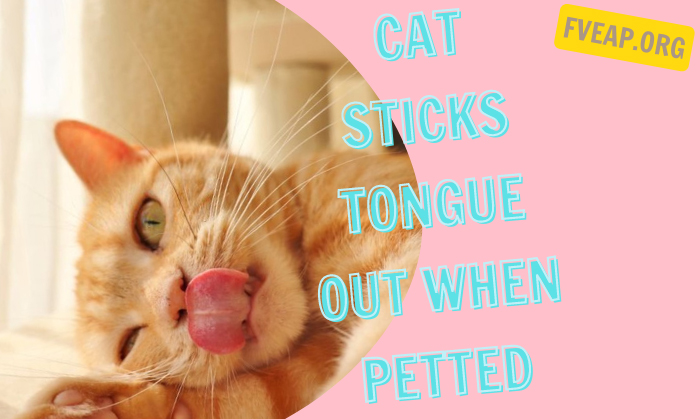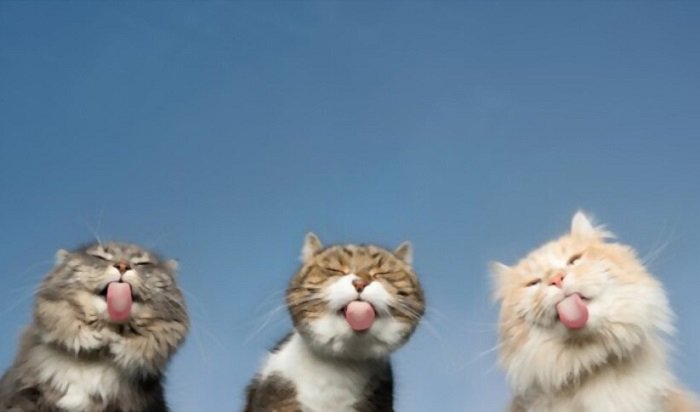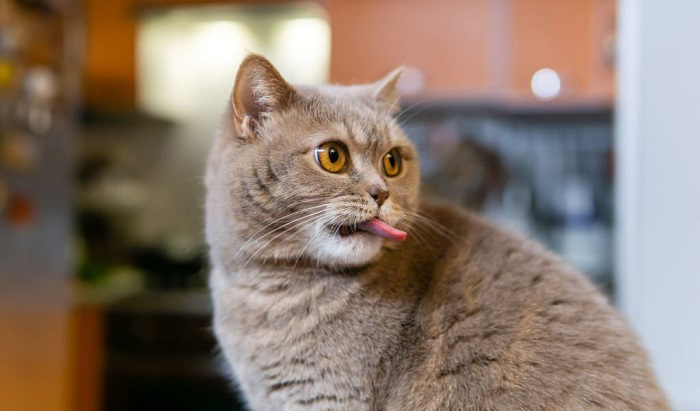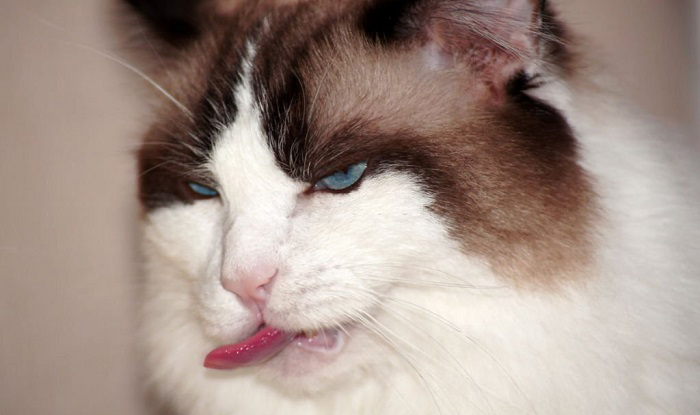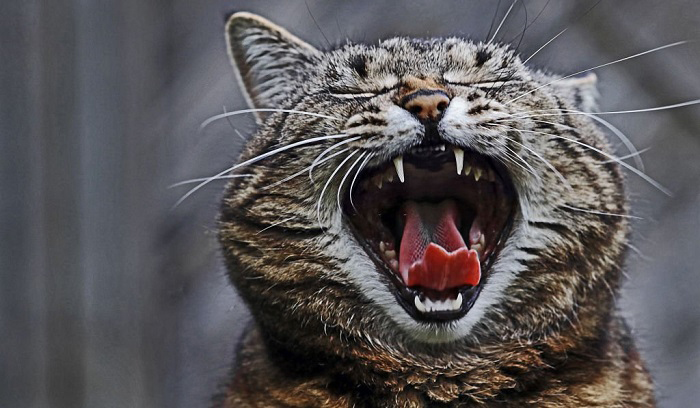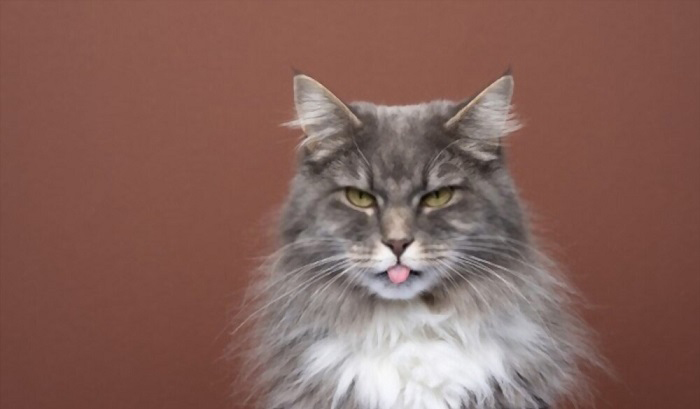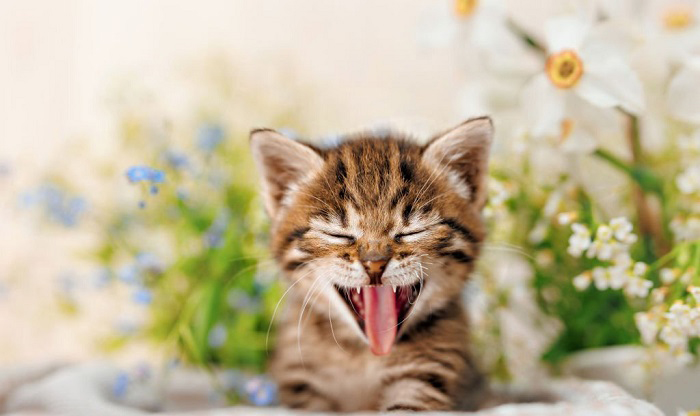Petting your cat is relaxing not only for you but also for your pet. When you scratch them, you may notice your feline friend purr or roll over.
A cat sticks tongue out when petted a positive response to this touch, analyzing scents, but it can also signify health issues.
This behavior may seem hilarious or confusing for some owners. However, it is mostly natural. But some instances indicate health concerns. Below are the top reasons why:
Table of Contents
Reasons Why Cats Stick Their Tongue Out When Petted
1. Flehmen Response
Curling the upper lip is quite common for cats. This action exposes the gums and insides of the mouth. Some owners find this weird and funny as it looks like their pets are sneering.
Why do they do this? Open-mouth breathing allows a cat to explore its surroundings. After all, scents and pheromones can be found drifting in the air.
However, the main purpose of the Flehmen Response is to transfer pheromones. Whether as a sign of affection or simply studying them, what may seem like a strange behavior is useful for the cat.
2. Pleasing the Owner
A cat sticking tongue out repeatedly means it is happy, especially when petted. Some owners even give them treats for doing this. This positive reinforcement encourages them to repeat the action.
3. Expressing Affection
There are many ways a cat demonstrates affection. While playing, you may notice your pet purring and rolling over. It varies on how it is petted, including the pressure and how often it is done.
Kittens do this as well. A kitten sticking tongue out can be a sign of attachment. They are used to feeding on their mother–sucking to drink milk. But as they grow up, they learn to control this and eat on their own.
4. Regulate their Body Temperature
To control its temperature, a cat flicks tongue. When the weather is hot, their bodies may overheat, and so they open their mouths to cool down. They do this sometimes, accompanied by panting.
But when there is excessive breathing involved, be on the lookout.
Heat stroke is common, especially when the cat’s body temperature goes over 105 degrees Fahrenheit.
Common signs of the onset of stroke are loss of control, vomiting, restlessness, and sticking of tongue out.
A similar thing goes with cold environments. To ward off the cold from their bodies, a cat stick the tip of his tongue out and licks parts of their bodies.
The latter action helps them warm up—transferring internal heat onto their bodies.
5. Medical Response
When given medicines, cats can become sluggish. Even when they are not sick, but the medicine is for maintenance, the effects can make them relax their jaws.
In their most relaxed state, the cat unconsciously lets its tongue fall out.
6. Dental Issues
A cat sticking his tongue out during or after eating is normal. This happens when there are food particles stuck on their teeth.
However, there are times when a cat has medical concerns, which is why they stick their tongue out. From a missing tooth and plaque build-up to cavities and gum diseases, these can make the cat uncomfortable.
This is why owners should be sensitive to the needs of their pets. Whether checking the feline’s mouth or taking the animal to the veterinarian, your cat’s health should be a top priority.
7. Exhausted Cat
Cats are playful animals by nature. They jump to elevated places, run around, roll over, and play with you on your lap. Naturally, constant play may tire them out. As they catch their breath, cats leave their tongues out.
While this is a natural reaction, look out for any health problems. After a while, your cat should stop panting. But if it continues for long and you can hear loud wheezing, check if your cat is still feeling all right.
Bring your feline friend to the veterinarian should the need arise.
8. Other Potential Health Conditions
Sometimes, the medical concerns of your cat have become serious. This happens when they go unnoticed. Here are some of the reasons contributing to why your cat sticks its tongue out:
1. Feline Dementia
When your cat has lived for so long, the chance that it will develop dementia has increased. Called Cognitive Dysfunction Syndrome (CDS), this refers to the deterioration of the cat’s brain.
Developing CDS is a slow process and may go unnoticed. Some signs to look out for are disorientation, anxiety, extreme irritability, changes in behavior, inability to follow routines, difficulty in urinating, and excessive licking.
As cats with CDS are slowly losing control of their bodies, they may stick their tongue out even when they are unaware or have no reason to.
2. Stomatitis
A painful, chronic condition, stomatitis is the inflammation of the cat’s mouth. It can be found in the gums, teeth areas, and back of the mouth. This is noticeable in the stark red color and rough texture of the tissues surrounding the teeth.
Generally, the cause is unknown, but it can be related to bacteria and virus infection.
When this happens, the cat is uncomfortable and has difficulties chewing. Some may experience drooling, panting, oral bleeding, and involuntary sticking of the tongue out.
3. Difficulties seeing
Apart from dementia, cats can have issues with their vision as they age. It can become a challenge to see, and so they rely on their other senses to react and move.
Cats stick their tongue out as scents are in the air to study their surroundings. The combination of pheromones and smells analyzed by the oral organ help cats navigate their path.
4. Respiratory Infection
Colds are the most common respiratory infection among cats. Their natural reaction is to stick their tongues out, especially in coughing.
9. Motion Sickness
When you bring your pet on your travels, you may notice your cat tongue sticking out drooling. This is a normal reaction especially when the surroundings are new to them. Together with the motion of the moving car, your pet may become nauseous.
When this happens, be careful with your cat. Don’t do anything unnecessary or touch it excessively. Simply be on the lookout for any negative behavior.
All these reactions will subside when your pet gets off the car. Let it recover once out, and before you know it, your pet is back to its normal self.
Conclusion
There are a variety of reasons why a cat sticks tongue out when petted. Most often, this is a normal response to the animal’s immediate surroundings and should not be a cause for panic.
But sometimes, there are underlying medical issues that accompany such action. As a pet owner, being sensitive to your cat’s needs is essential. In this way, you can have your feline treated right away.
Before you go, make sure to check out these related posts to other cat’s behaviors when petted:
- If your cat bites you when you pet her, here is the reason!
- And there are the reasons why your cats drool when petted.
Also, don’t forget to check this guide to find out the 4 best places to pet your cats.

I am Amy Sawy, a Doctor of Veterinary Medicine (DVM) graduate from the University of Kansas. y husband, Dr. Plummer, and I own a veterinary clinic in Phillipsburg, Kansas. In addition to my professional background, I am a devoted pet owner myself, with a household that includes dogs, rodents, and most notably, cats – a total of five felines in my home.
In 2020, I joined an organization as a professional writer, leveraging my experience and collaborating with my team to deliver the most valuable information for your cat’s care.


